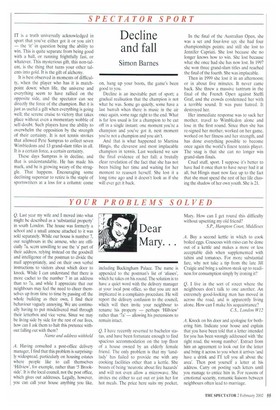Decline and fall
Simon Barnes
IT is a truth universally acknowledged in sport that you've either got it or you ain't — the 'it' in question being the ability to win. This is quite separate from being good with a ball, or running frightfully fast, or whatever. This mysterious gift, this non-talent, is the thing that turns your other talents into gold. It is the gift of alchemy.
It is best observed in moments of difficulty, when the player who has it is matchpoint down; when life, the universe and everything seem to have rallied on the opposite side, and the spectator can see directly the force of the champion. But it is just as useful a gift when everything is going well; the serene cruise to victory that takes place without even a momentary wobble of self-doubt. Such players have the ability to overwhelm the opposition by the strength of their certainty. It is not tennis strokes that allowed Pete Sampras to collect seven Wimbledons and 13 grand-slam titles in all. It is a certain force, a certain certainty.
These days Sampras is in decline, and that is understandable. He has made his mark, and he is growing weary of the struggle. That happens. Encouraging some declining superstar to retire is the staple of sportswriters at a loss for a column: come on, hang up your boots, the game's been good to you.
Decline is an inevitable part of sport; a gradual realisation that the champion is not what he was. Some go quietly, some have a last hurrah when there is music in the air once again, some rage right to the end. What is far less usual is for a champion to be cut off in a single instant: one moment you're a champion and you've got it, next moment you're not a champion and you ain't.
And that is what happened to Martina Hingis, the cleverest and most implacable champion in tennis. Last weekend we saw the final evidence of her fall; a brutally clear revelation of the fact that she has not been biding her time and waiting for her moment to reassert herself. She lost it a long time ago and it doesn't look as if she will ever get it back. In the final of the Australian Open, she was a set and four-love up; she had four championships points; and still she lost to Jennifer Capriati. She lost because she no longer knows how to win. She lost because what she once had she has now lost. In 1997 she won three grand-slam titles and reached the final of the fourth. She was implacable.
Then in 1999 she lost it in an afternoon; or in about five minutes. It never came back. She threw a massive tantrum in the final of the French Open against Steffi Graf, and the crowds condemned her with a terrible sound. It was pure hatred. It destroyed her.
Her immediate response was to sack her mother, travel to Wimbledon alone and lose in the first round. Since then she has re-signed her mother, worked on her game, worked on her fitness and her strength, and has done everything possible to become once again the world's finest tennis player. The snag is that she can no longer win grand-slam finals.
Cruel stuff, sport. I suppose it's better to have had it once than to have never had it at all, but Hingis must now face up to the fact that she must spend the rest of her life chasing the shadow of her own youth. She is 21.






























































 Previous page
Previous page